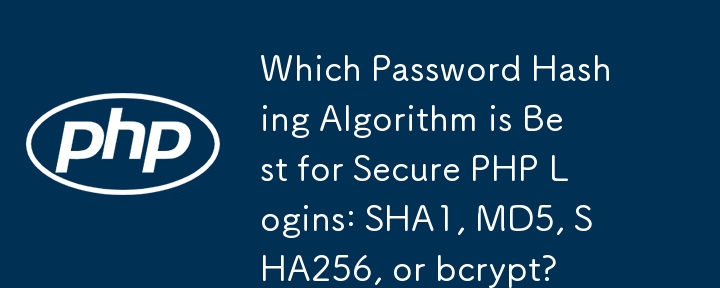

Password Hashing in PHP: SHA1, MD5, SHA256 vs. Bcrypt
When designing a secure PHP login system, the choice of password hashing algorithm is crucial. While SHA1, MD5, and SHA256 have traditionally been used, they are vulnerable to cracking due to their fast computation.
Recommendation: Use Bcrypt Instead
For optimal security, it is recommended to abandon the mentioned hashing algorithms and instead adopt bcrypt. Bcrypt is designed to be computationally intensive, making it highly resistant to cracking.
bcrypt Implementation in PHP
PHP 5.5 and later provide built-in functions for bcrypt hashing:
<code class="php">// Creating a hash
$hash = password_hash($password, PASSWORD_DEFAULT, ['cost' => 12]);
// Verifying the password against the stored hash
if (password_verify($password, $hash)) {
// Success! Log the user in.
}</code>Generating Salt
Bcrypt automatically generates a salt using a cryptographically secure pseudorandom number generator (CSPRNG). It is therefore unnecessary to manually generate and combine a salt with the password.
Cautions with bcrypt
To mitigate these issues, avoid using password hashing libraries that pre-hash passwords before running them through bcrypt. Instead, opt for reputable libraries like ZendCrypt or PasswordLock that handle hashing securely.
Conclusion
While SHA1, MD5, and SHA256 were once considered acceptable hashing algorithms, they are no longer recommended for PHP logins due to their vulnerability to cracking. Bcrypt has emerged as the preferred choice for secure password storage, offering a higher level of protection against unauthorized access.
The above is the detailed content of Which Password Hashing Algorithm is Best for Secure PHP Logins: SHA1, MD5, SHA256, or bcrypt?. For more information, please follow other related articles on the PHP Chinese website!




